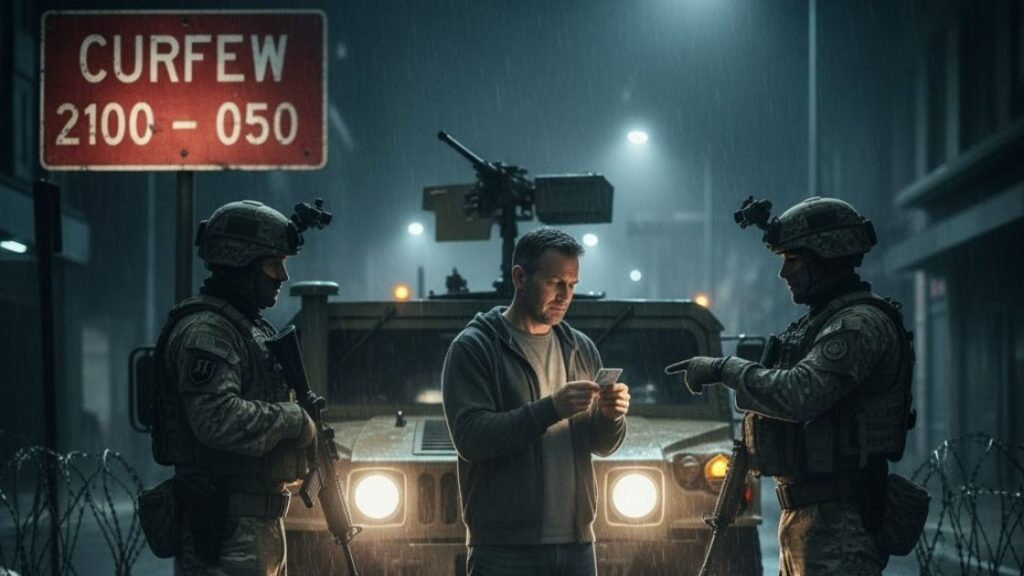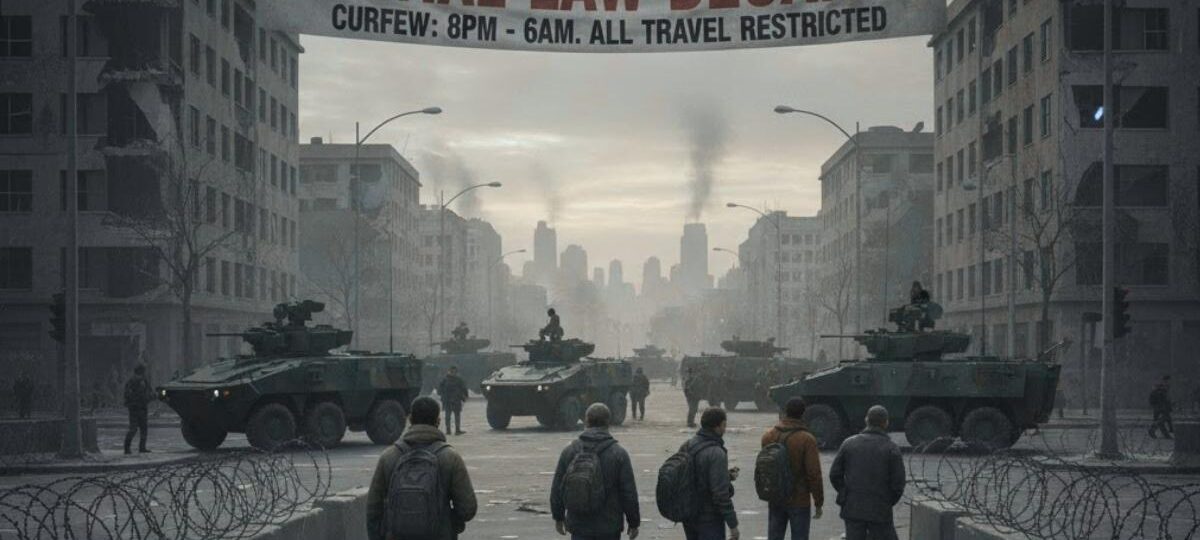What to do if martial law is declared? The declaration of martial law is a rare and momentous event, signaling a severe crisis where civilian government functions are partially or wholly suspended, and military authorities assume control. It is typically a measure of last resort, enacted during times of war, invasion, insurrection, or massive natural disaster, when civil authorities are unable to maintain order. While not meant to be permanent, this suspension of ordinary law can drastically restrict civil liberties, including freedom of movement, speech, and assembly.
Understanding what martial law means and having a prepared plan is crucial for personal and family safety. This comprehensive guide outlines the immediate actions and long-term preparations you should make to navigate this extraordinary period and maximize your chances of survival and safety until civilian rule is restored.
Understanding Martial Law and Its Impact
Martial law fundamentally replaces the ordinary legal system with military rule. This transfer of authority grants military commanders the power to enforce laws, impose regulations, and run civilian institutions.
Key Implications of Martial Law:
- Suspension of Civil Liberties: Freedoms normally protected by the constitution, such as the right to free movement, assembly, and protection from unreasonable searches, may be significantly curtailed or suspended.
- Curfews and Checkpoints: Curfews are common, restricting movement during specified hours, and military checkpoints will be established to control traffic and identify individuals.
- Military Justice: The normal civilian court system may be replaced, in whole or in part, by military tribunals or courts-martial for civilians accused of violating the new military decrees. The writ of habeas corpus, which protects against unlawful detention, may be suspended, allowing for potentially indefinite detentions.
- Seizure of Resources: In extreme circumstances, the military may have the authority to take private property, including food, water, and fuel, for official use.
It is important to remember that while martial law imposes strict controls, the military’s primary goal is to restore order. Your cooperation and low profile are your best defense against undue scrutiny.
Phase 1: Immediate Actions Upon Declaration
The moment a declaration of martial law is announced, quick and decisive action is required to ensure your immediate safety and that of your family.

1. Tune In and Confirm the Facts
- Get Reliable Information: Immediately seek out and listen to official communication channels—emergency broadcasts, radio, television, or authorized government websites. The information you receive should be from a confirmed, authoritative source.
- Verify Restrictions: Determine the specific scope of the martial law declaration:
- What areas are affected (city, state, region)?
- What is the curfew time and are there specific travel restrictions?
- Are there any prohibited activities (e.g., assembly, protest, carrying certain items)?
- Do Not Rely on Social Media Rumors: Panic and misinformation spread quickly in a crisis. Stick to confirmed, verifiable news.
2. Move to Safety and Secure Your Home
- Get Home Immediately (If Away): If you are outside your home, prioritize getting back before the curfew takes effect or before travel is completely restricted by roadblocks. Use your pre-planned “get-home” route.
- Stockpile Essentials: Do a quick inventory and bring any immediately accessible water, non-perishable food, and medical supplies into your most secure area.
- Secure Doors and Windows: Ensure all entry points are locked and reinforced. Visibility should be limited from the street; use curtains or blinds.
- Communicate with Your Family: Implement your family communication plan. Confirm everyone knows the plan, the rendezvous point, and that they should stay home and off the streets.
3. Adopt a “Gray Man” Strategy
To avoid drawing attention from both military forces and desperate civilians, adopt a low-profile approach:
- Stay Inconspicuous: Do not wear military-style or tactical clothing. Choose neutral, ordinary clothing that helps you blend into the background.
- Do Not Attract Attention: Avoid any actions that make you seem overly prepared, prosperous, or defiant. Hide your abundance and don’t discuss your preparations or supplies publicly, even with neighbors you think you trust.
- Minimize Technology Use: Assume all forms of electronic communication (cell phones, internet, landlines) are being monitored. Use brief, non-specific language or pre-arranged codes for essential communication.
Phase 2: Operating Within a Martial Law Environment
Once the initial shock subsides, your focus shifts to day-to-day survival and minimizing interactions with military personnel.

1. Navigating Curfews and Checkpoints
- Strictly Adhere to Curfew: The single most important rule is to respect the curfew. Being outside during curfew is an immediate risk of detention or worse.
- Interacting with Authority: If you must interact with military or law enforcement personnel at a checkpoint or patrol:
- Be Polite and Respectful: Maintain a calm, non-confrontational demeanor. Do not argue, question their authority, or make sudden movements.
- Follow All Orders: Comply immediately with all instructions, such as showing identification, submitting to a search, or stepping out of your vehicle.
- Keep Documentation Ready: Always have official identification (driver’s license, passport, etc.) readily accessible, along with any necessary documents (e.g., prescriptions, permits).
- Do Not Take Photos or Record: Recording military activity can be seen as an act of defiance and may lead to the immediate confiscation of your device and detention.
2. Maintaining Supply Security
- Ration Wisely: Strictly ration your stored food, water, and medical supplies. Martial law could last weeks or months.
- Diversify Storage: Avoid keeping all your crucial supplies in one visible location. Establish a layered storage strategy with a small, readily accessible decoy stash, a main hidden cache, and a prepared Go-Bag (Bug-Out Bag) containing a 72-hour supply of essentials for emergency evacuation.
- Prioritize Water: Water is the most vital resource. Use stored water judiciously and know how to purify additional water from local sources if necessary (boiling, chemical treatment, filtration).
3. Legal Rights and Restraints
Though martial law curtails many liberties, the government is generally still bound by the Constitution, though this is often debated and interpreted differently in a crisis.
- The Right to Remain Silent: If detained or questioned, you have the right to remain silent. Do not volunteer information or elaborate on answers. Simply state your name and address if required.
- Search and Seizure: While military patrols may conduct searches, be aware of what is being taken. Do not resist, but attempt to note the specifics of what is searched and seized.
- The Value of Documentation: Keep detailed, written records of any interactions, detentions, or seizures you witness or experience. This documentation may be vital should you seek legal recourse after the state of martial law is lifted.
Phase 3: Long-Term Preparation and Resilience
Effective survival during martial law is rooted in preparations made long before the crisis begins. These steps focus on self-reliance and community intelligence.

1. The Prepper’s Checklist: Essential Supplies 🎒
- Three Months of Non-Perishable Food: Focus on calorie-dense, long shelf-life items (canned goods, dried beans, rice, and sealed emergency rations).
- Water Supply and Purification: Store at least one gallon of water per person per day. Include water purification tablets, filters, and bleach for disinfection.
- First Aid and Medicine: A comprehensive first-aid kit and a minimum three-month supply of all necessary prescription medications.
- Power and Communication: A hand-crank or solar-powered emergency radio to receive news when other forms of media are down. Flashlights, extra batteries, and possibly solar chargers.
- Cash and Barter Goods: Banks and ATMs may be inaccessible. Keep a supply of small bills in cash and non-essential items that can be used for bartering (e.g., alcohol, tobacco, coffee, specific medical supplies).
2. Home Defense and Security 🏠
- Physical Security: Install high-quality deadbolts, reinforce doors and windows, and keep all valuable items out of sight.
- Perimeter Awareness: Know your surrounding area. Use observation posts or strategic viewpoints to monitor the neighborhood for trouble spots or patrol patterns.
- Concealment is Key: If you possess firearms for self-defense, be fully aware that new military decrees may make possession or carrying illegal. Conceal any weapons, ammunition, or tactical gear completely. Non-lethal defense options (e.g., pepper spray) may be more appropriate for deterrence.
3. Operational Security (OPSEC) and Intel
- Maintain Your Routine (Quietly): A predictable, boring routine makes you forgettable. Don’t engage in visible new activities.
- Be an Observer: Quietly collect intelligence. Note the patterns of military patrols, the locations of supply drops, and the movement of other civilians. This intel can help you plan essential trips (e.g., for water or a medical emergency).
- Limit Trust: Be extremely judicious about who you trust. Only share critical information with your immediate, proven inner circle (family). Loose talk or bragging about resources is a major security risk.
Conclusion: Survival Through Prudence and Preparation
The declaration of martial law represents a period of extreme vulnerability and uncertainty. While the circumstances that lead to it are often beyond an individual’s control, your reaction and preparation are not. Self-reliance, invisibility, and non-confrontation are the core pillars of survival. By stocking essential supplies, securing your home, and operating with a low, inconspicuous profile, you drastically increase your chances of safely weathering the storm until the military authority is withdrawn and civil liberties are fully restored. Preparedness is not paranoia; it is the ultimate expression of personal responsibility.
See Also: 48 Laws of Power List: Master Influence and Strategy Now










